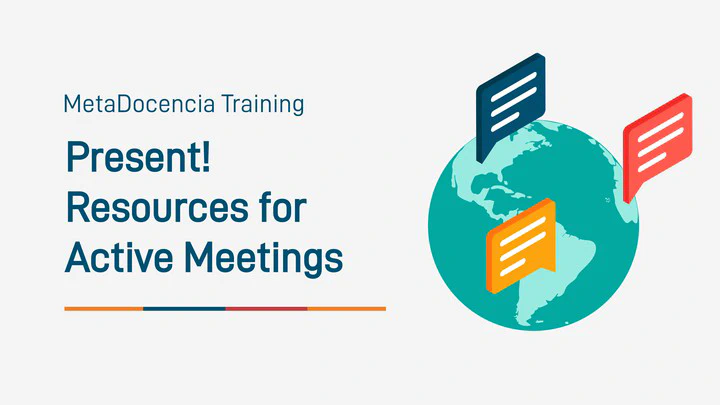Present! Resources for Active Meetings

This workshop will be offered in Spanish. Dates and registration form (in Spanish)
Table of Contents
Objectives
To introduce basic good practices for classroom (or seminar, workshop, talk) in face-to-face, hybrid or online environments (e.g., using Zoom). Every detail of the workshop, from the demonstration of interest and pre-registration form to the feedback request at the end of the workshop, including its execution using Zoom, is a demonstration of the strategies that can be adopted or adapted to any synchronous teaching.
During this online workshop:
We will demonstrate how to contact and prepare students to join a synchronous class
We will demonstrate how to manage an up-to-20-person synchronous virtual classroom using Zoom
We will see examples of how to create a positive environment for our audience
We will have an introduction to the pedagogical concepts of:
- Designing classes keeping the audience that will be receiving the material in mind (learning personas)
- Outlining a course content using concept maps
- Formative evaluation with diagnostic power approximately every 15 minutes to know if your students are following the class and correct them on the fly when you detect that something is not clear to most of them
- Participation in a joint collaborative document to take notes or solve formative assessments
- Other bite-sized, evidence-based, and easy-to-implement pedagogical tools
- Asking your audience for feedback after each class and the importance of including both positive and negative feedback
We will present key sources, in increasing order of complexity, from which we will continue to learn pedagogical practices
We will present MetaDocencia and how to join our educational community
Intended public of this course
There are no specific requirements for this course other than speaking Spanish.
When we designed this workshop, we had in mind Juan, Andrea and Florencia as our learner personas.
Juan splits his teaching time between delivering workshops for companies and classes at High-school. He has a lot of experience in technology tools, he teaches from Home. He takes care of his 2-yo and 4-yo daughters.
Andrea is 30 years old and has a postdoctoral fellowship. She won her first teaching position and knows a lot about the subject she will be teaching but has no teacher training and needs tools to be able to deliver the content efficiently.
Florencia is a teacher of Information and Communication Technologies. She is the mother of a girl about to start elementary school. She knows that she needs to incorporate effective tools to update contents and formats and that would have positive impact on her students’ vocation, educational and professional trajectories.
Check out personas (in Spanish) to read more about them.
Not included in this workshop
Since we only have 3 hours, a lot of things will be out of reach of the workshop. Among other things, we will not learn:
- In-depth strategies for teaching online
- Theory of pedagogy or educational sciences
- Specific techniques for teaching content from different fields of knowledge
- Specific techniques for handling classes of more than 30 people
How to participate
This workshop will be offered in Spanish. Dates and registration form (in Spanish)
The workshop is free. Those invited to the workshop agree to abide by our code of conduct.
Duration
This is a 3-hour workshop with intervals (ideally away from any screen) of approximately 5 minutes for every 50 minutes of content.
Sample schedule
This schedule assumes the start of the course is 9 am, but this will vary according to the time slot we will mention in the invitation message.
| Time | Activity |
|---|---|
| Time to connect and make sure your audio and video connection is good (if you don’t have a camera it doesn’t matter, but if you do, it helps) | |
| 9:00 - 9:05 | Establishing ground rules to minimize frustration during teleconference |
| 9:05 - 9:15 | Introduction |
| 9:15 - 9:20 | Exercise: imagine and share a learning persona who will be in your class |
| 9:20 - 9:30 | Course concept map |
| 9:35 - 9:50 | Exercise: create a concept map |
| 9:50 - 9:55 | Break away from the screen |
| 9:55 - 10:05 | Helpful tips for virtualizing your class on short notice |
| 10:05 - 10:10 | Exercise: think about how to apply the virtualization tips to your class |
| 10:15 - 10:30 | Useful tips for managing a class via teleconference |
| 10:30 - 10:35 | Exercise: what did we use so far of all the above? |
| 10:35 - 10:45 | Tips for making classes more accessible |
| 10:45 - 10:50 | Break away from the screen |
| 10:50 - 11:05 | Tips to keep your audience motivated |
| 11:05 - 11:20 | Breakout room exercise in smaller groups to discuss motivation strategies in your context |
| 11:25 - 11:40 | How to join the MetaDocencia community with a demonstration tour of Slack |
| 11:40 - 11:45 | How to give good feedback |
| 11:45 - 11:50 | Tell us what you thought of the course |
| 11:50 - 12:00 | Closing |
Course materials (in Spanish)
Do you want to re-use any of our contents? Please, be our guest!
Our materials are available for free under this license. You can reuse or edit any material that appears here, the only thing we ask in return is that when you reuse our materials you include a reference to this website. For further information, contact us at cursos@metadocencia.org.